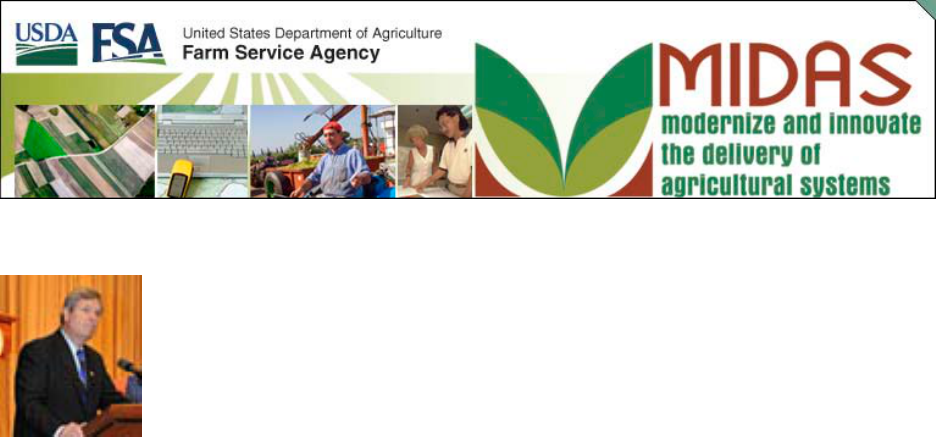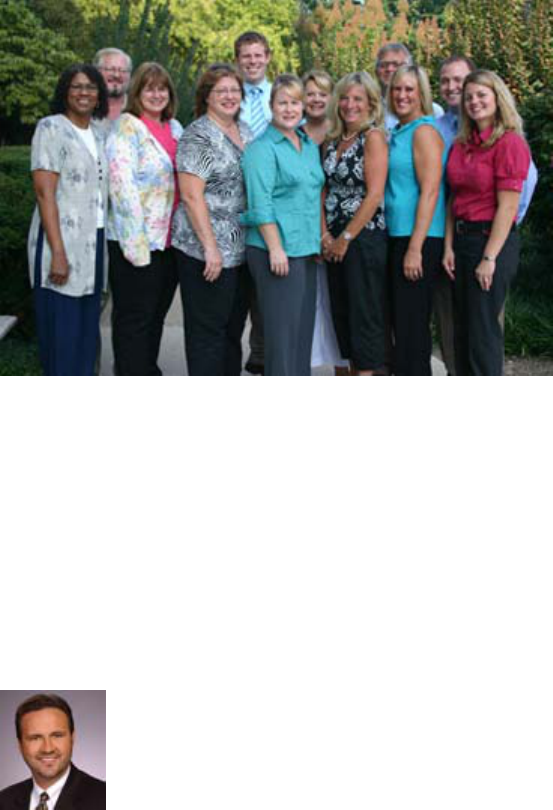
MIDAS Project Kickoff Held
Photo of USDA Secretary Tom Vilsack
Earlier this summer in the Jefferson Auditorium in the USDA South Building in
Washington, DC, department and Farm Service Agency (FSA) leadership and
employees gathered to officially kickoff the MIDAS project. MIDAS is FSA's initiative to
Modernize and Innovate the Delivery of Agricultural Systems.
"My vision of this is that there is a day when farmers either have the convenience of
going into the FSA office or maybe just doing it at home," said USDA Secretary Tom
Vilsack, of the benefits the MIDAS project will bring to the delivery of farm programs to
more than 1.5 million farmers, ranchers and producers. "And they're thinking to
themselves, 'You know, this is a pretty good deal. Because it's a lot simpler than I
remember and this is going to give me time. That time is going to allow me to do a
better job and I appreciate my government respecting my time."
FSA Administrator Jonathan Coppess told the audience, which included about 200 in
Washington and thousands more tuning in via a live web cast:
"This is an incredible undertaking. I don't think we can understate that point."
Coppess said that MIDAS is fundamentally about two things. "First, MIDAS is an
investment in our county offices and field structure that will help our incredible field staff
improve service to farmers."
"The second main point I want to stress about MIDAS is it's not just computers,"
Coppess said. "What this is, is an entire modernization effort. Modernizing the way we
do business, cleaning up our processes, making it more efficient, making it less trips
between county offices for a farmer, less time spent at a countertop to do applications
and signups - to modernize the way we do business to, again, serve farmers and
ranchers."
The heart of the MIDAS initiative is to improve the delivery of FSA programs through the
re-engineering of FSA business processes and the adoption of enhanced and
modernized information technology. MIDAS will modernize the delivery of farm
programs and services in the following ways:
Improve access and convenience for producers, ranchers, famers, and field office
employees
Rapidly develop and deploy new farm programs using modernized Information
Technology (IT) systems and software
Advance and streamline business processes using industry best practices and
methodologies
Achieve compliance by improving oversight, management, and accountability for
administering FSA farm programs.
What MIDAS is NOT:
The term MIDAS has been heard often but misconceptions may have formed
surrounding what it is, what it intended to do, and how it would affect those directly
related to FSA programs and services.
MIDAS is NOT an effort to reduce or eliminate County Offices - Instead, MIDAS will
allow County Office staff to better deliver services and benefits to their customers.
MIDAS is NOT new hardware - As one of several modernization initiatives, MIDAS
specifically encompasses improved business processes, enhanced service delivery
through the use of new IT functionality and capabilities, and new software application
technology to deliver farm programs. The new software application technology will be
supported by SAP, a Commercial-Off-the-Shelf (COTS) software package.
MIDAS is NOT stabilization - Stabilization refers to operations and maintenance of
current legacy and web-based systems. MIDAS is in its planning phases and until the
new application software is deployed and in operation, stabilization is non-existent for
MIDAS.
MIDAS is NOT just an IT initiative - MIDAS is a collaborative, cross-functional effort
within FSA. MIDAS involves the entire organization. MIDAS intends to involve all of FSA
personnel at various phases of the project.

Meet Your MIDAS Team
The MIDAS project is a large and dynamic program that will ramp up over time. Here
are some key members of the MIDAS Team:
Back row: Ned Johnson, Darrin Watkins, Gwen Uecker, Dan Holen, Michael Walter
Front row: Mary Porter, Jean Knight, Michelle Larkin, Julie Pena, Elizabeth Miller, Laura
Schlote, Tara Wedemeyer
For a complete listing of the MIDAS Team Members, please visit the MIDAS Website
Leadership Corner - Jim Gwinn
Photo of FSA CIO Jim Gwinn
As the Chief Information Officer for USDA's FSA, I am responsible for managing the
information technology organization and leading FSA's Information Technology
modernization initiatives. It is paramount for us to update our agency's legacy
technology and operations infrastructure. During my private sector career, I've led
several global technology transformation and restructure initiatives and I am confident
that together, we will transform our agency through the course of these efforts.
I am excited to work with such a talented staff dedicated to FSA's mission goals of
improving the delivery of services and benefits to the farmers and ranchers who rely on
our programs. I am also committed to the success of FSA's Modernization initiatives
and look forward to the progress we'll make in the days ahead.
Did you know? COTS
Commercial, Off-The-Shelf (COTS) software was mentioned earlier, but what is it
exactly?
COTS is simply a term that defines technology that is ready-made and is available for
sale, lease, or license to the general public. Often, COTS refers to computer software or
hardware systems. COTS can offer significant savings in procurement and maintenance
since they are an alternative to in-house developments or other government-funded
developments.
MIDAS will use a COTS software solution such as SAP ERP to deliver farm benefits.
An SAP ERP landscape includes software-based and web services-based business
activities. This will increase adaptability, flexibility, openness, and efficiency.
Process Improvements Already Underway
While the MIDAS project is just getting underway, some of the underlying modernization
and innovation has already been going on for quite some time and achieved significant
results. In fact, the output of quick hits projects using the Lean Six Sigma methodology
has resulted in more than $10 million in savings per year (combination of hard and soft
savings).
Lean Six Sigma is a recognized industry best practice for business improvement which
focuses on increasing the speed and quality of a process. In 2008, FSA began its LSS
efforts with site visits to county offices throughout the country to capture current
business processes for the top 5 farm benefit programs, to uncover pain points, and to
seek recommendations.
Thus far, one of the greatest LSS success stories surrounds the Signature Authority
process that county offices identified as their biggest issue. An LSS team was
assembled by the MIDAS office, consisting of state and county staff, along with DC
staff. The team used standard LSS methodology to complete this quick-hit project. The
data collection and analysis by the team showed that on average, it took nearly two
hours for the county staff to verify signature authority for one producer, going through
the legal document(s). Staff are not lawyers by profession and it is hard to interpret legal
language written in those document(s). The MIDAS team quantified that over a half a

million hours per year were being spent by the county staff across the country
examining legal documents to determine signature authority.
Based on this analysis, the MIDAS LSS team came up with a proposed solution,
allowing producers to self-certify their signature authority on CCC-902 form by simply
checking a box. This resulted in an annual savings of approximately $8 million to FSA.
Going forward the MIDAS LSS team will support the business functional teams as they
prepare for and conduct blueprinting and Proof of Concept work.
MIDAS Mind Teaser
Think you've got the smarts? See if you can match the following acronyms to their real
designation. Answers are on the MIDAS Website.
SAP:
• Seriously Awesome Platform.
• Systems Applications and Products in Data Processing.
• Software Application Processor.
• Servers Applications and Portals
ERP:
• Enhancement Resource Portfolio
• Enterprise Reliability Planning
• Enterprise Resource Planning
• Enhancement Reassurance Portfolio
Have a puzzling acronym? Send it along to: askmidas@usda.gov .
